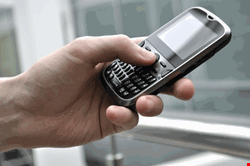

When most people think of the term ‘computer’, the image of a cell phone does not come to mind. However, today’s smartphones (such as the iPhone, BlackBerry, and Android) are indeed computers. Not only do they have an operating system and storage capabilities, but they also have their own software applications – called ‘apps’ for short. Once users understand that smart phones are actually mini computers, those who are charged with keeping corporate computers safe will have some serious planning to do.
Concern #1: Can data on your smartphone become compromised?
Yes. According to the mobile phone security firm Lookout, which recently scanned nearly 300 000 free applications for the Apple iPhone and devices built around the Google Android mobile operating system, many apps secretly pull sensitive data off users’ phones and deliver it to third parties without notification.
The data can include full details about users’ contacts, their pictures, text messages, and internet and search histories. Among the third parties are advertisers and companies that analyze data on users. Currently, the information being gathered is used by companies to target ads and learn more about their users.
This is a major concern not only for users, but also for companies whose employees use smart phones for work-related activities. If advertisers can get access to people’s demographic and usage information, then what information could hackers and identity thieves claim?
Concern #2: Is it possible to get a virus on your smartphone?
Yes. Because a smartphone is a mini computer, you could have an infected phone just as you would an infected laptop or desktop. Launching an app is just like launching any other software. Just as some traditional computer operating systems are more vulnerable and attacked more often than others, so too are certain smartphones.
For most companies, the discussion has not yet included concerns about smartphones being hacked or infected by viruses. But as smartphones and apps evolve, these occurrences will happen more and more often. Therefore, there’s great need and opportunity for companies to make their smartphones and applications even more secure.
Evolution of Mobility
JP Morgan Mobile recently launched an iPhone app that allows private banking clients to view their account balances, transaction history, and investment activity, as well as transfer funds between accounts, pay bills and credit cards, and send wire transfers – all from their smartphone. Additionally, Chase recently released an iPhone app that allows their customers to take a photo of the front and back of a check they want to deposit, upload it to Chase, and have the check deposited into their account without ever having to go to the bank.
This is all part of the evolution of mobility, but it also brings up security issues.
The good news is that we’ve dealt with security issues in the past, and we can do so again. Think back a few years when things as online shopping, online stock trading, and online banking first came out. People thought these were crazy concepts that would never take off.
Why? Because customers were worried about their information being compromised.
Today, however, such online transactions are commonplace, and you’d be hard pressed to find someone who hasn’t engaged in at least one of these online activities. People started accepting these online tasks as routine because banks and other companies put in security measures and policies to protect users. In other words, they took away the fear.
The same thing needs to happen now in terms of smartphone security.
The Future of Smartphone Security
So what does the future of smartphone security look like? Not only will it entail anti-viral apps that can scan your smart phone, but it will also mean having security measures such as biometric identification (i.e., facial recognition, voice recognition, and fingerprint authentication) as well as better encryption in place for the next-generation apps – what I’ve coined as ‘enterprise-level’ apps. These are apps customized for such wide-scale applications as purchasing, logistics, supply chain management, sales, patient care, and military security, just to name a few.
Realize that tomorrow’s apps will be like having a virtual assistant by your side. These apps won’t just make you more productive when working; they’ll actually do some of the work for you. For example, in the medical field, we’ll see apps for disease management, patient records, and remote diagnostics. The app will be more like an essential tool to perform a specific function rather than an ancillary item, which is why security is paramount.
With that, we’re going to see the companies who create these enterprise-level apps build encryption into their programs – the same level of encryption and security as traditional computers and software have. After all, when we talk about apps and smartphones, we’re really talking computers, software, and online activity.
Of course, this doesn’t mean desktops, laptops, and software packages are going away. The old will remain; people will simply change their preferred interface device. And as these changes permeate the business community, people will get used to the things they are now leery of, provided that application security takes precedence and evolves as quickly as the technology itself.
Daniel Burrus is a leading technology forecaster and business strategist, and is the author of six books, including the highly acclaimed Technotrends, which has been translated into over a dozen languages. He is the founder and CEO of Burrus Research, a research and consulting firm that monitors global advancements in technology-driven trends.